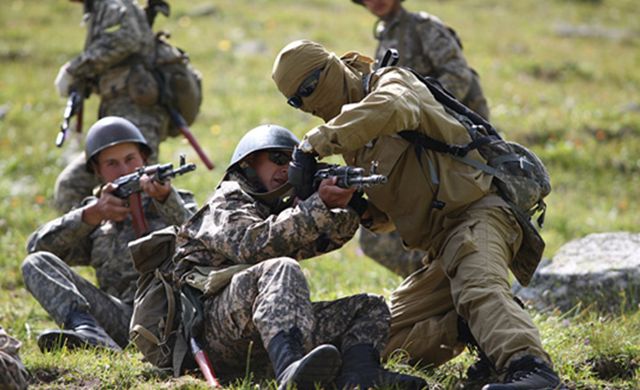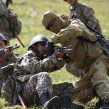
Jund al-Khilafa Operations Expand in Kazakhstan
Publication: Terrorism Monitor Volume: 9 Issue: 46
By:

Jund al-Khilafa (JaK) has carried out a string of deadly attacks within Kazakhstan since October. While JaK has come no closer to achieving its goal of bringing down the government of Nursultan Nazarbayev and creating an Islamic state, it has rattled Kazakhstan in a way that the country has never experienced. Attacks on policemen and clashes with security forces are occurring with increased frequency.
A December 3 shootout in Boraldai village outside of Almaty highlights the type of threat JaK poses in Kazakhstan. Five members of a JaK cell, including the leader, and two Kazakh Special Forces soldiers were killed in a night raid on the cell’s safe-house after the terrorists refused to surrender despite being outmanned and outgunned. The members of the cell were responsible for killing two Almaty police officers in the same village in a roadside shooting on November 8 and were planning new attacks in Almaty (Tengrinews, December 5). This cell may also have been involved in a similar November 11 shooting in which two police officers in Almaty were killed (Central Asia Online, November 11).
In the JaK statement issued three days after the Boraldai village shootout, the group said "We are ready to be killed in the thousands in order to support [Islam], and losing our lives is a cheap price that we pay for this cause." As in previous statements, JaK taunted “the apostate forces of the Nazarbayev regime“ that JaK says “attacked a base where the five lions of the al-Zahir Baybars Battalion of Jund al Khilafa were gathered…” [1]
The composition of the Boraldai village cell resembles the cell of Maksat Kariyev, a former expert rifleman in the Kazakh army who went on a two hour drug-induced murderous rampage in Taraz on November 12. He killed five security officers, one gun-shop guard, and himself in a suicide explosion that took out one police commander. Kariyev’s cell was comprised of six to seven members and had a spiritual leader (Tengrinews, November 30; RFE/RL, November 30).
Jund al Khilafa issued a statement praising Kariyev’s “martyrdom” four days after his attack (ansar1.info, November 16). The speed with which JaK released the statements about Kariyev’s attack and the Boraldai village shootout and the accurate details they contained show that the JaK leaders based in the Afghanistan-Pakistan border region are well informed about the operations of JaK cells in Kazakhstan.
Kariyev’s attack, however, was planned within Kazakhstan. After six members of Kariyev’s cell were arrested in mid-November, the investigation showed that the spiritual mentor and other cell members had drawn up the attack plans for Kariyev and purchased and stored the RPG-26 grenade launcher, RGD-5 grenade, Makarov pistol and two sawed-off shotguns that Kariyev used in the attack (Tengrinews, November 30).
In contrast, the JaK leadership provided direct instructions for an ultimately botched October 31 operations to a cell in Atyrau from their base near the Afghanistan-Pakistan border. The cell members were only responsible for buying the components for the explosives in local pharmacies, assembling the bombs, and carrying out the attacks according to JaK’s orders (Interfax [Astana], November 9).
The operation in Atyrau failed when one bomb detonated without effect in a garbage can and the other device blew up the militant before he reached his target. This was perhaps a reflection of the fact that the attackers in Atyrau were radicalized Muslims with no previous military experience. They had connected to JaK only after they independently decided to carry out a terrorist attack. JaK may have selected more experienced militants like Kariyev if the plan had originated with the JaK’s leadership.
JaK has shattered the idea that Kazakhstan can continue to remain insulated from the violence 1,000 miles south in Afghanistan and across the Caspian Sea in the North Caucasus. In December 2006, Kazakh security forces dismantled Hizb ut-Tahrir’s (HuT) networks and seized computers, printing presses and 25,000 pamphlets belonging to HuT (Interfax-Kazakhstan, December 22, 2006). In November 2006, Kazakh authorities arrested eleven people from the terrorist cell Stepnogorsk Jama’at, which was planning hostage sieges, explosions, and robberies to fund attacks on state officials (Izvestiya Kazakhstan, December 26, 2007). From 2007 to 2011, there were no major terrorist attacks in the country despite Nazarbayev’s policies of restricting religion and maintaining authoritarian control of the country’s politics and resources.
As JaK’s violent spree shows, Kazakhstan can no longer remain unaffected by regional geopolitics for several reasons:
- The havens in the Afghanistan-Pakistan border region provide the JaK leadership with the operational space and connections to plan attacks with the Taliban, conduct media campaigns and recruit new fighters. In addition, many Kazakh students now in Pakistan have become radicalized and if they return home they could present a long-term threat to the country (Tengrinews, October 20).
- The Arab Spring has made secular autocracies in the Muslim world more vulnerable by destroying the myth of their invincibility. The JaK said in an October 21 statement that the Nazarbayev regime would follow Tunisia, Egypt and Libya because of Nazarbayev’s anti-Muslim policies (Noviy Regyon [Moscow], October 26). [2]
- Kyrgyzstan’s weak internal security can be exploited by Kazakh terrorists as a means to smuggle weapons into the country. Kazakh terrorists may also be able to hold meetings and hideout in Kyrgyz territory without coming under the surveillance of Kazakh authorities (Kabar [Bishkek], November 14).
- The North Caucasus has become a source of Salafist influence in Kazakhstan, especially in the Western part of the country where Atyrau is located. Said Buryatsky (a.k.a Aleksandr Tikhomirov), the late Russian-born Islamic convert who became a jihadi ideologue in the North Caucasus before he was killed in a Russian special operation last year, served as the source of inspiration for the Atyrau cell (Tengrinews, November 9). In the JaK message after the Boraldai village shootout, the group blamed Russia for "the repression of the Kazakh people."
Given the geopolitical factors surrounding JaK’s rise, the group is unlikely to fade away like the Stepnogorsk cell or lose influence like Hizb ut-Tahrir five years ago. Rather, Jund al Khilafa will likely continue attacks on Kazakhstan security forces similar to those carried out by the Kariyev cell and the Boraldai village cell.
Notes:
2. For the video, see: https://www.dailymotion.com/video/xly24k_yyyyyyyyy-yyyyyyyyyy-yyyyyyyyyy_news#from=embediframe
Jacob Zenn holds a Juris Doctorate from Georgetown Law where he was a Global Law Scholar. He is an international affairs analyst with experience in all seven Central Asian “Stan” countries, including completing a course of Russian language study in Bishkek, Kyrgyzstan in 2007, Farsi/Tajiki language study in Samarkand, Uzbekistan in 2008, and Uighur/Uzbek language study in Urumqi, Xinjiang Province, China in 2011.





